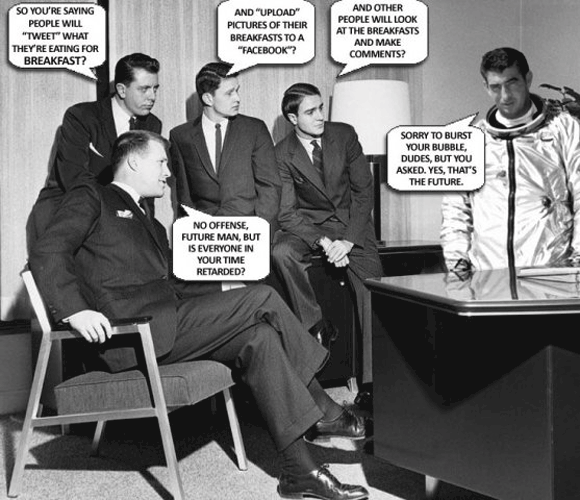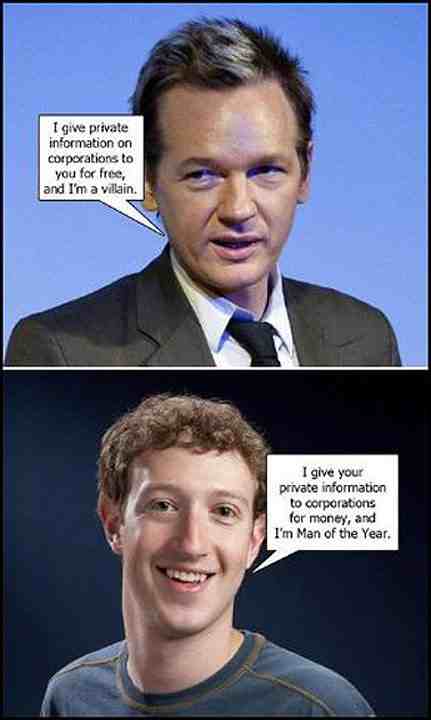I’ve been a Facebook user for quite a few years now. I’ve had a lot of fun over that time sharing links and music, copy/pasting jokes, quotes and snippets of wisdom and engaging in some good ol’ fashioned banter. I have always been more than a little concerned about the privacy implications but like the rest of you, I was willing to give up a little privacy in exchange for the benefits of using the service. As time has gone on, Facebook has gradually become more and more invasive and it’s now got to the point where I am no longer comfortable using it.
Those of you who were my friends on Facebook will know I regularly posted links about privacy concerns related to Facebook and explanations of the privacy settings to try and encourage you to be secure and think about the data you are sharing – whether knowingly or not. I never liked being tagged in photos and it used to frustrate me that there was no way to approve them before they went live. After all, your face and the web can tell everything about you.
 Things were only ever going to get worse, what with the facial recognition and the revelation that Facebook tracks you even after you logout (which has supposedly been fixed but who knows for sure). It’s the end of the web as we know it and most of you feel fine. I’m not sure what to be more worried about, the fact this is happening or the fact most of you don’t care and are willing to continue down this road with no end to the madness in sight.
Things were only ever going to get worse, what with the facial recognition and the revelation that Facebook tracks you even after you logout (which has supposedly been fixed but who knows for sure). It’s the end of the web as we know it and most of you feel fine. I’m not sure what to be more worried about, the fact this is happening or the fact most of you don’t care and are willing to continue down this road with no end to the madness in sight.
“Facebook’s Open Graph technology allows third-party websites to tell Facebook what people are doing. It extends Facebook’s Like button to include any action that the site owners think might be interesting to Facebook. Play a song and your music streaming site tells Facebook what you’ve played. Read a newspaper article and Facebook knows what you’ve read. LOL at a lolcat and your LOL gets logged for all time on your indelible activity record. Facebook calls this “frictionless sharing”, which is their euphemism for silent total surveillance. Once you’ve signed up for this (and it is optional, at least for now) you don’t need to do anything else to “share” your activity with Facebook. It’s completely automatic.
At least Facebook is up front about Social Graph. Facebook’s abuse of its Like button to invade people’s privacy is much less publicised. We all think we know how it works. We’re on a website reading an interesting page and we click the Like button. A link to the page gets posted to our wall for our friends to see and Facebook keeps this data and data about who clicks on it to help it to sell advertising. So much so predictable.
What most people don’t know is that the Like button tracks your browsing history. Every time you visit a web page that displays the Like button Facebook logs that data in your account. It doesn’t put anything on your wall but it knows where you’ve been. This even happens if you log out of Facebook. Like buttons are pretty much ubiquitous on mainstream websites so every time you visit one you’re doing some frictionless sharing. Did you opt in to this? Only by registering your Facebook account in the first place. Can you turn it off? Only by deleting your account.”
 I’m reminded of the satirical How to Access the Internet (A Guide from 2025) as I plough through the old posts on my wall, deleting them as I go. It’s amusing but all too close to the truth of what’s to come and what has come about even since the article was written in just 2010.
I’m reminded of the satirical How to Access the Internet (A Guide from 2025) as I plough through the old posts on my wall, deleting them as I go. It’s amusing but all too close to the truth of what’s to come and what has come about even since the article was written in just 2010.
It’s not just me with these concerns – here’s articles from the Washington Post and Poynter demonstrating I’m not wearing a tin foil hat about this.
“Facebook spent years making it easier for us to share by building its network and placing “Like” buttons across the Web. Its latest idea goes much further, turning sharing into a thoughtless process in which everything we read, watch or listen to is shared with our friends automatically.
Encouraging sharing is great. Making sharing easier is even better. But this is much more than that. What Facebook has done is change the definition of “sharing.” It’s the difference between telling a friend about something that happened to you today and opening your entire diary.”
 So what can you do about it? Well, as this post on Diaspora neatly points out, by staying on Facebook and Google+, you passively condone their invasion of your privacy.
So what can you do about it? Well, as this post on Diaspora neatly points out, by staying on Facebook and Google+, you passively condone their invasion of your privacy.
“You make it harder for your friends to leave because you’re still there. Stop enabling Big Social. Quit perpetuating inertia. Be a leader, not a follower.”
So the ideal first step is to ditch your Facebook account. Now I know that’s not gonna be for everyone, some of you just let out a little guffaw or possibly even a little gasp of horror at the thought but moving away from Facebook to an open platform like Diaspora is the only way you are ever going to own your online identity. If you insist on using Facebook, at least take a few simple steps to stop them tracking your every move.
If you do want to leave, you’ll want to take all your data with you. Thanks to EU law, everyone has the right to the protection of personal data. As Facebook have an office in Ireland and your user agreement is a contract with the Irish office (if you live within the EU), you can force Facebook to release ALL of your data to you. This post from TechEye explains more.
All power to you if you do have the guts to leave and even more power to you if you never signed up in the first place. I’m still keeping my account for business use (at least for now) but I’m no longer using Facebook for anything personal and when I do login, it will be in a separate browser to stop as much of the tracking as possible.
Some people might see this as social suicide but it’s all getting a bit too creepy for my liking. I’ll use this blog for sharing music, links etc. so check in often or just add the RSS feed to your reader.
See you around, online and off.
Much love,
Rikstaroonie
Views: 0
Hello RIkki,
Great blog, mate! I look forward to following your future entries with interest.
I find Facebook (FB) to be inherently frustrating in the way that it continues to tinker with what I consider to be a successful existing format, and while I made the same decision that you did with regard to giving up some privacy for what amounts to a social service, I also share your feeling that this shouldn’t compromise you further if FB decides to widen its scope in future.
It’s difficult to see exactly what the goal of ‘frictionless sharing’ actually is. I am not a terrorist or a dangerous militant, and anyone who was those things would be silly to study relevant websites and/or post information on FB. Internet usage can already be tracked in other ways, allowing agencies to identify individuals with potentially dangerous personal interests.
Likewise, if the goal of the endeavour is simply to sell advertising, the last laugh is on those advertisers. My browser is set up to block all adverts, and does so very effectively.
Perhaps foolishly, I wonder if there is not a degree of misguided altruism in Zuckerberg’s business model. There is only so much money that you can make and spend, after all, and the political scope for surveillance may be significant but in my view, singularly pointless. It is well known that Zuckerberg is a socially-awkward man, and I suspect that on some level, the goal of his frictionless sharing is about forcing each of us to publicly be who we really are, with nothing hidden. This suggests that one of his goals is an attack on what he perceives as hypocrisy. In his eyes, the only alternative to full unveiling of your personality is no social contact at all.
I could go on, but I think there are specks of light at the end of this particular tunnel. All good things come to an end, and I think that FB may be on the wane. The number of users may be increasing, but on recent evidence, the number of people using it to say anything more profound than ‘Wow, I just ate breakfast!’ is diminishing all the time. Eventually, the inanity will grow to the point where it becomes a staple for the dumb majority and an occasional novelty for whimsical smart people, a bit like X-Factor.
Now, if you’ll excuse me, I just have to go onto Twitter and tweet about what I’m having for lunch.
Kris
Thanks for your reply Kris and apologies for the delay in my response.
I think Facebook’s goal is to create a web within the web – a kind of walled garden where they can track your every click and present you with pre-approved content.
An article that I forgot to include in this post was The Eternal Value of Privacy which points out that privacy is not about hiding a wrong, but is in fact a fundamental human right.
Going back through my old posts on FB made me realise just how much inane crap I had in fact posted. It made me think that from now on, I should only post something if it’s actually of some value to share. This is precisely the opposite of the FB way as with frictionless sharing, everything will be posted – whether you thought it was worthwhile or not. This removes the curation – the act of sifting through all the content you consume and only sharing the good bits.
Now that everything gets shared, how do you distinguish what’s interesting? We’ve lost the value of sharing in the first place.
I’m not worried though, the change has inspired me to finally setup this long talked about blog page where I can do as I please and I really haven’t missed logging on to FB every day (which has surprised me really). At least here I get to decide what I post and I own all my data. If nobody reads it, I really don’t care – better to write for yourself and have no public than write for the public and have no self! 🙂